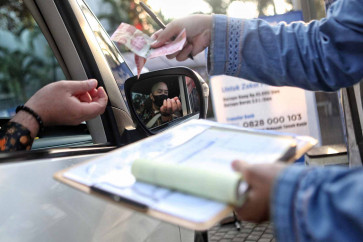Popular Reads
Top Results
Can't find what you're looking for?
View all search resultsPopular Reads
Top Results
Can't find what you're looking for?
View all search resultsCould going religious spur trillion dollars in extra financing for SDGs in Indonesia?
Islamic finance principles and tools are very much aligned with SDG values; avoiding excessive speculations, promoting risk-sharing and limiting debt to the value of assets.
Change text size
Gift Premium Articles
to Anyone
I
ndonesia is primarily a proud faith-based community that values charitable giving to the underprivileged in the name of compassion and compliance with religious teachings. The big question is: what if religious donations were dedicated toward accelerating the achievement of the Sustainable Development Goals (SDGs) in Indonesia?
Indeed, harnessing religious financing mechanisms is one way of closing the SDGs financing gap. Like many countries, Indonesia struggles to close this gap, where millions of dollars are missing on an annual basis – at least US$1 trillion prior to the pandemic (SDGs Roadmap, 2019). Bringing religious funds as integrated solutions is a viable solution given how central religion is to the approximately 270 million people in the country.
Indonesia’s dominant faith is Islam, and its diverse community has played a breakthrough role in channeling some of its charitable funds such as almsgiving zakat and waqf (endowment) to SDG initiatives. Islamic financing has also tapped into the global and domestic financial market to raise much-needed funds for SDGs through the issuance of sukuk (Islamic bonds).
But other religion-based financing schemes such as Christian Perpuluhan and Kolekte, Hindu Punia and Buddha Dana, have yet to be mainstreamed into SDG initiatives. Also, to make it more strategic, those instruments have to be included in Indonesia’s Integrated National Financing Framework (INFF), which provides a strategy for financing national priorities.
Eleven years ago in Social Work Journal, Abidin’s study revealed the estimated collection of all social religious funds was worth a minimum of Rp 147.5 trillion (US$10 billion). With the trend continuing to grow over the years, its collection now is very likely to be increased.
Despite the limited estimates, these religious funds offer big potential. In Indonesia, there has been an increase of 41.15 percent in beneficiaries from philanthropic activities, which previously benefited 91.7 million people in 2018-2020. Around 84.9 percent of philanthropic organizations adopted SDGs as their program reference, where significant contributions were made to the health sector, education and the reduction of inequality (Filantropi Indonesia, 2021).
A few challenges persist (e.g. data management, productive deployment, programmatic planning, personal preferences and trust issues), which hinder society from channeling funds through institutions. Trust reduces the cost of funds through effectiveness, efficiency, credibility and reputation, boosting institutions’ performance to maximize utilization to the beneficiaries.
















